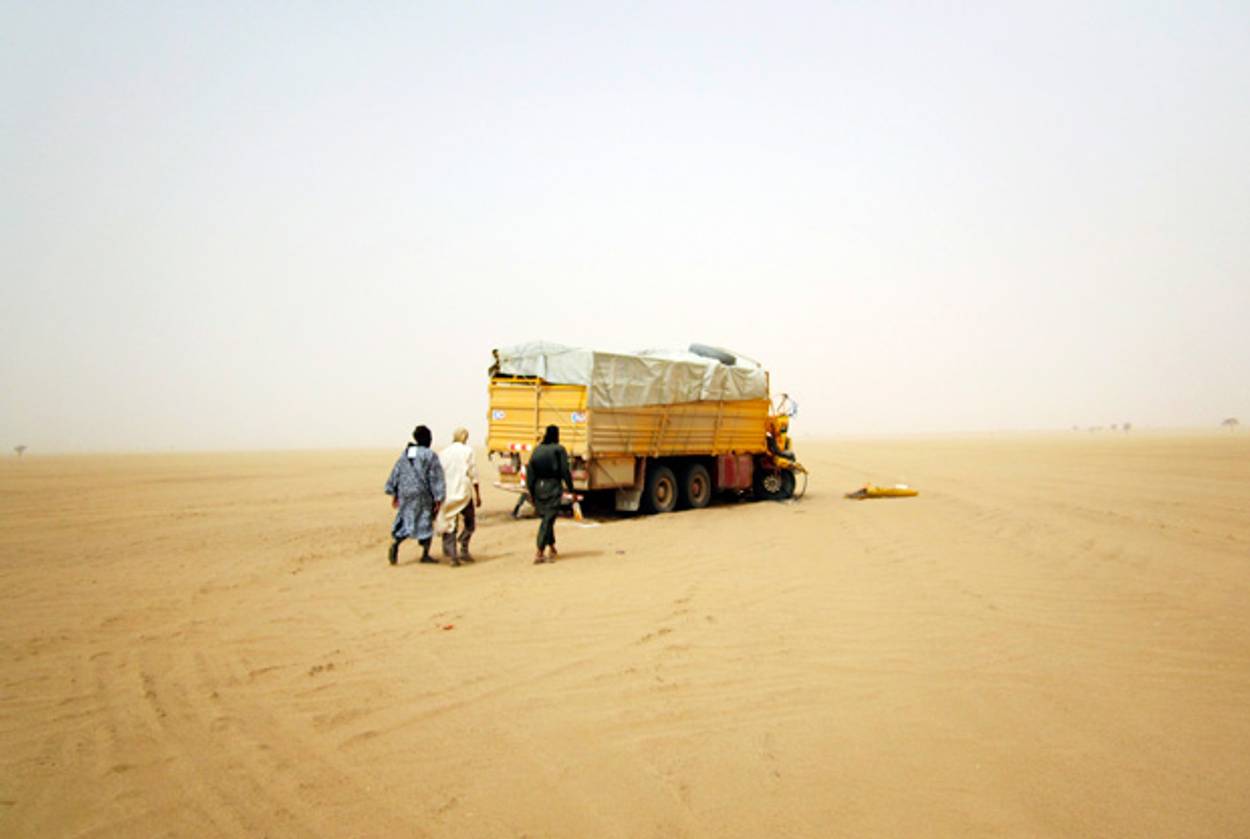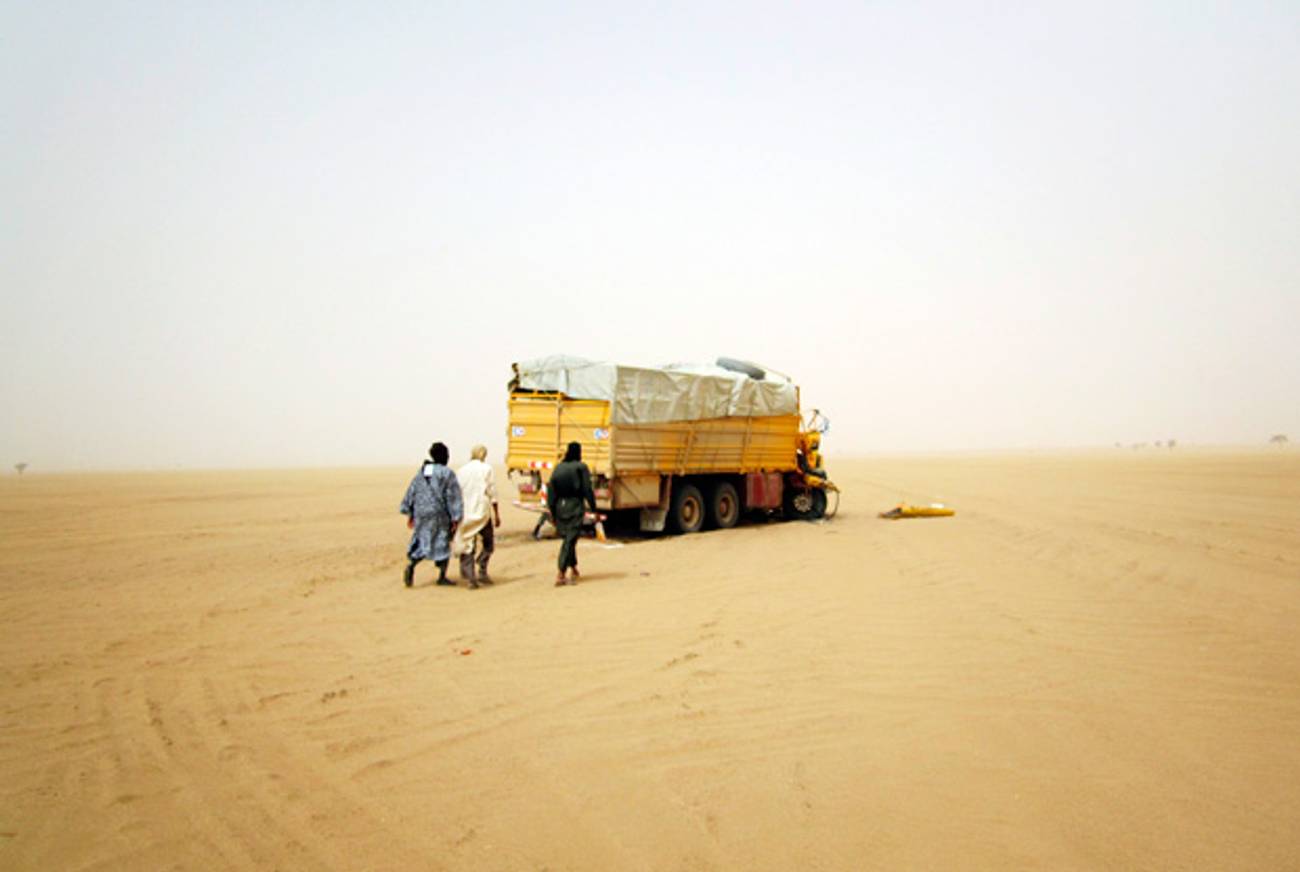Songs of Desert Wanderers
I was drawn to Mali’s nomads and their musical pleas for a homeland, until they allied with Islamists




Last week I heard my friend, the great Malian singer Khaira Arby, playing in Manhattan. She was performing a new song called “La Paix,” an emotional exhortation to peace and reform in her home of Timbuktu, a city racked by political unrest in recent decades. Khaira has been thrilling audiences around the world with her politically charged anthems, performed with her band’s trademark breakneck beats and vertiginous virtuosity.
But the forum for this recent concert was not a club or world-music festival. The concert was taking place in a humble elementary-school auditorium in Harlem as a fundraiser, hastily put together by members of the Malian expat community, and the audience consisted almost entirely of Malians. In the last six months, a refugee crisis of unprecedented proportions in Mali’s history has been unleashed by a revolt of the Tuareg, a semi-nomadic group living throughout the Sahara desert. This is not the first Tuareg uprising in Mali by any means, but it is the first to attain the goal of establishing regional authority. In April, the Tuareg liberation army, known by its initials MNLA, declared the independence of the Republic of Azawad, encompassing a vast swath of Mali’s northern Saharan region, including the major cities of Timbuktu, Gao, and Kidal.
When I heard word of the current Tuareg uprising, my first impulse was to get on a plane for Algeria and make my way across the desert to join the rebels. I have always seen the Tuareg as, like Jews, original transnationals. Like the Jews, the Tuareg have been a conduit of culture, bringing the Arab world into deeper contact with Africa both through commerce and the movement of ideas. Particularly in their music traditions, the centuries-old syncresis of worlds and stories spanning the desert are palpably present. It was through the music of the pioneering Tuareg rock band Tinariwen that I began to fall under the spell of Tuareg culture. I was particularly drawn in by the melancholy and nostalgic image of the desert that underscored so much of their poetry. The longing for a dream past brought with it the vision of a homeland existing primarily in poetic utterance and musical flights of imagination—the kind of homeland I could understand.
And then, for the first time, it looked this year as though the Tuareg, taking advantage of regional instability after a coup in Mali, were going to be able to establish their own nation—distinctly echoing the romance of first-generation Zionism. So, you can imagine my disgust and despair when I realized that the Tuareg rebels’ partners in the uprising were Ansar Dine, a fundamentalist Islamic group with ties to al-Qaida.
How is it possible that the Tuareg, a fiercely independent nomadic people with a tradition of moderate Islam and of strong social roles for women, could allow their movement to be co-opted by a rag-tag group of Salafist Islamic radicals who had long been troubling the region with their banditry and smuggling operations? In fact, the Malian government’s inability to rein in al-Qaida in the Islamic Maghreb had been one of the pretexts for the current uprising. Even more troubling were the blind destruction and looting associated with the rebellion. “This is not a question of independence; this is a question of banditry,” Khaira said in a recent interview. “If you want to be independent, you don’t destroy what you’ve taken. You conserve it.”
***
The Tuareg live throughout Muslim West Africa. In Mali, Niger, Senegal, Libya, and other nations the Tuareg have known approbation and persecution. Mali, in particular has had a particularly fraught relationship with the Tuareg. As a group with a strong self-identification as unbounded nomads, the Tuareg were a thorn in the side of the Malian government, with its mission of nation building and its authoritarian measures aimed at creating a cohesive identity out of a hodge-podge of tribal groups. Their deeply ingrained liminality, their essential image of themselves as nomads, was at odds with the post-independence mood of Mali. In 1963, a Tuareg uprising was brutally put down by the Malian army and was followed by state-sanctioned pogroms. This initial experience of ethnic violence deeply influenced a generation and directly led to wave after wave of rebellion. One of the founders of Tinariwen, Ibrahim Ag Alhabib, witnessed his father being executed for helping the rebels. He enshrined the horrors experienced by the Tuareg in the song “Soixante Trois”:
’63 has gone, but will return
Those days have left their traces
They murdered the old folk and a child just born
They swooped down to the pastures and wiped out the cattle …
’63 has gone, but will return.
Incredibly, the Tuareg rebellion of 1990-96 was resolved peacefully. In Timbuktu, after a treaty was signed, rebels laid down their arms and a bonfire was raised from the mountain of weapons. And in 2000, the Festival of the Desert was established as an annual musical celebration of the peace and of Tuareg culture. It was also envisioned as a point of encounter between artists from throughout Mali and all over the world. The festival was one of the first times the new Tuareg culture that had been brewing in the milieu of the rebellion was exposed to the world. Out of their 2000 performance at the Festival of the Desert, word of Tinariwen’s pioneering work began to spread.
I had the good fortune to attend the 2010 Festival of the Desert, in what sadly now looks like one of its last years. Tuareg from throughout the region had descended on the stretch of desert outside of Timbuktu for the festival and set up encampments. But not only Tuareg were there. Every ethnic group in Mali was represented, as well as hundreds of Western tourists. The location was incredibly remote, but at the same time, the culture of Timbuktu and the Festival of the Desert spoke to the impossibility of any region in the world being isolated. Even more striking were the ways in which Western music and technologies had been repurposed by local musicians in innovative and brilliant ways. Tinariwen, and the host of young Tuareg bands they have inspired, speak to the transnational spirit of our day and the ways in which embracing elements of foreignness without fear can help construct the truest expression of one’s own culture.
In addition to Tuareg and other Malian bands, there were a few Western acts as well—including my band, the Sway Machinery. Part of the mission of the festival was to present as many international acts as possible, to turn the Festival of the Desert into a true world music festival. We were the first band presenting any aspect of Jewish culture at the festival, and it was humbling and inspiring to see thousands of turbaned men pumping their fists in the air and dancing along as I sang my grandfather’s Aveinu Malkeinu Z’khor.
In the heat of the day, sitting in a circle in a Tuareg tent with a family singing and clapping, I had visions of sitting around my grandfather’s table with my cousins singing nigunim. Throughout my life, the image of a dream past has focused around the sound of words I can’t fully understand and images of a childhood home that has disappeared. The longing for a homeland troubles my sleep. I’ve long been bothered by an uneasy feeling that the world of modernity is in opposition to the place of imagined belonging. The rupture between my dream past and the present I inhabit was riven both by political violence and by an internalization of the received wisdom that the world of my ancestors is irredeemably lost. But, as is well known, the past is never dead, and resurrection can be enacted through the imagination. I looked to Tuareg as brothers in the fight for agency in the struggle for self-naming and self-knowledge.
It is understandable to me why the Tuareg rebels would take a by-any-means-necessary approach to attaining the feverishly anticipated goal of independence and align themselves in political marriages of convenience with terrible forces. But I now fear that the poetic imaginings of the rebel poets in Tinariwen may bear bitter fruit for those who follow that dream into battle. In their classic recording “Amassakoul ‘n’ Ténéré,” Ibrahim conjures up an image of unity between personal identity and the desert he has know since birth:
I know how to go and walk
Until the setting of the sun
In the desert, flat and empty,
where nothing is given
My head is alert, awake
I have climbed up and climbed down
The mountains where I was born
I know in which caves the water is hidden
These worries are my friends
I’m always on familiar
terms with them and that
Gives birth to the stories of my life
The song paints a clear image of the individual embodying the virtues of the landscape and of the primacy of personal memory and experience in framing a true knowledge of home. What a far cry these deeply poetic and pointedly individualist musings are from the reality at play in Azawad today, with the black flag of Salafist militants flying over Timbuktu and all secular music having been banned.
In recent weeks the discourse about Tuareg agency in the rebellion and the power play between the Tuareg rebels and Ansar Dine has grown more pointed. There have been intense about-faces, as the MNLA have made proclamations denouncing Ansar Dine and then the next day announcing a treaty between the two parties as equals in establishing the fledgling state. Meanwhile, the refugee crisis mounts daily, and the likelihood of international coalitions imposing bloody military solutions grows.
As far as I can see there is no actual homeland that can offer what the poetic image of home has to offer. There is no bloodshed in nostalgia or murder in a prayer. Once these feelings are harnessed to political realities, they make us weak and susceptible to the influence of untrustworthy charlatans and soulless extremists. It is tragic to see this pattern played out on the grounds of the Festival of the Desert, one of the places in the world that seemed to speak of the true potential for art and culture to create real reconciliation. It makes me think about Jerusalem.
And I think about my friend Khaira, whose grief over the current situation is the most eloquent statement I have found in my reading on the conflict. It is all I can do to remain hopeful that the vision she holds of a shared life in Timbuktu for all of the city’s people will be reestablished, speedily and in our days.
Yes. The song says, “We need peace. Without peace we can’t do anything. Without peace we can’t travel. Without peace we can’t sing. And we, the Africans, we have to be helped, but not with arms. We prefer schools. We prefer vehicles. We prefer tools to farm with. We prefer water pumps. And this Mali, this country that I love, we do not deserve this. Mali does not deserve this. Above all, Timbuktu does not deserve this. We are sisters and brothers. Sons and daughters.” In Timbuktu, you can say you are black and I am white. That never existed with us. That is not our history. I am sick. I am sick. I am too sick to sing, but despite that, I will sing to have peace.
***
Like this article? Sign up for our Daily Digest to get Tablet Magazine’s new content in your inbox each morning.
Jeremiah Lockwood is the leader of the band The Sway Machinery.
Jeremiah Lockwood is the leader of the band The Sway Machinery.